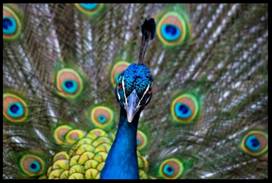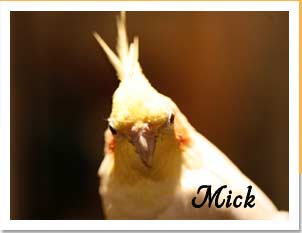So, Just What is a “Companion Bird?”
By Vincent J. Hrovat
 Since both of the organization’s co-founders were cockatiel owners, Mickaboo was founded in 1996 with the name Mickaboo Cockatiel Rescue. Within a few years the organization had quickly expanded its volunteer base, capacity and scope. In spite of the word “Cockatiel” in the name, Mickaboo volunteers were rescuing, fostering and adopting out all kinds of birds that were commonly kept as pets, including parrots of all sizes and softbills such as finches and canaries. If a pet bird needed rescue in the San Francisco Bay Area, Mickaboo Cockatiel Rescue was there for it.
Since both of the organization’s co-founders were cockatiel owners, Mickaboo was founded in 1996 with the name Mickaboo Cockatiel Rescue. Within a few years the organization had quickly expanded its volunteer base, capacity and scope. In spite of the word “Cockatiel” in the name, Mickaboo volunteers were rescuing, fostering and adopting out all kinds of birds that were commonly kept as pets, including parrots of all sizes and softbills such as finches and canaries. If a pet bird needed rescue in the San Francisco Bay Area, Mickaboo Cockatiel Rescue was there for it.
After a few more years, Mickaboo renamed itself as Mickaboo Companion Bird Rescue, a change that was intended to reflect the organization’s increasingly broader scope of operations. Since then, Mickaboo has taken in entire aviaries of birds, not always tame, and over 50 of the wild conures from the San Francisco flock who have needed medical care. Mickaboo’s MickaCoo division takes in feral and pet doves, feral pigeons, and king pigeons who were originally raised for food. Mickaboo volunteers have provided supportive care, transportation, and new permanent homes for ducks, chickens (especially roosters), chukars, pheasants and a few kinds of quail. A contingent of our volunteers helped to clean oiled sea birds at the International Bird Rescue site in Suisun after the Cosco Buson and similar oil spill events.
Clearly, the definition of “companion bird,” for Mickaboo, is broad enough to include most birds who live in a human world and who need our help.
Of peacocks and people
The Indian Peafowl (Pavo cristatus), one of two species in the genus Pavo, is a member of the pheasant family. More commonly known as peacocks and peahens, these birds are best known for the males’ large, colorful tails. Peafowl are native to southern Asia and common in India, but they have become popular in the United States due largely to their cosmetic appeal. Peafowl are not easily domesticated, are prone to screaming, and need plenty of space to roam.
Peafowl are often purchased as outdoor birds by people in suburban or rural communities. Unless they are kept in a fenced-in enclosure, peafowl will frequently wander off and become feral. They are fairly hardy birds; peacocks and peahens can reproduce in most environments and it is not uncommon for feral flocks of peafowl to flourish in human environments. Due to their noise and the fact that they can be destructive to flower gardens, these flocks can be perceived as a problem in their communities.
Pretty Boy the peacock came from such a background. He was among the last surviving peafowl from a flock that lived in a Los Gatos neighborhood for several years. In March of this year, a resident noticed that Pretty Boy didn’t look well; he was sitting on her lawn, apparently unable to move around well, and seemed bedraggled and listless. The person who saw Pretty Boy in this state consulted with a friend about what she should do. Her friend suggested that she contact Elizabeth Young of MickaCoo.
As soon as Mickaboo’s CEO, Michelle Yesney, heard the details about Pretty Boy from Elizabeth, she knew that he needed our help. Michelle immediately contacted one of Mickaboo’s preferred avian veterinarians, Dr. Fern Van Sant at For the Birds, and Fern agreed to make it a priority to provide care for Pretty Boy as soon as someone could bring him in.
Michelle contacted Pretty Boy’s finder in Los Gatos and asked her if she could arrange to get Pretty Boy to the vet. The finder had her husband help her to get Pretty Boy safely packed into a large cardboard box, which was not very challenging since Pretty Boy was too weak to try to get away. Not only did the finder and her husband transport Pretty Boy to the vet, but they very generously paid the first $500 of his veterinary bills and solicited their neighbors to donate more for his care. Pretty Boy’s finders had become his rescuers.
As soon as Pretty Boy got to For the Birds, he was examined by Dr. Van Sant. Pretty Boy was obviously a very sick bird. He had apparently been shot in the chest with a shotgun and subsequently attacked, either by a predator or a human. His neck was injured as if something had tried to rip his head off. As soon as his rescuer found out that he’d been shot, she helped to set up a neighborhood watch to help protect other feral peacocks and wildlife from a similar fate.
Pretty Boy was too weak for surgery or even for anesthesia to clean his wounds, but Dr. Van Sant got him stabilized and treated him for pain and infection. In spite of the best efforts of all of the staff at For the Birds, Pretty Boy passed away after several days in intensive care.
Pretty Boy was the first peacock that Mickaboo has rescued, but he probably won’t be the last. His story did not have a happy ending but it did include a few positives: a neighborhood has become more sensitive to the needs of the feral animals that live there, and a lot of people chose to do the right things in getting Pretty Boy the help he needed.
If you have feral peacocks in your community, it would probably be a good idea to consult with your neighbors about what to do about them. They should be kept in a safe and enclosed environment, safe from predators and people with guns. If that’s not immediately possible, they should at least be monitored to see that they are relatively safe and have access to ample food and water.
Our thanks, once again, to all of those who chose to make a difference in their community by responding to Pretty Boy’s plight, and who choose to proactively prevent similar future incidents.

